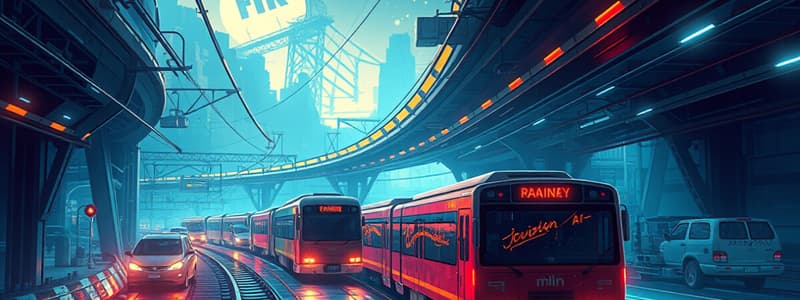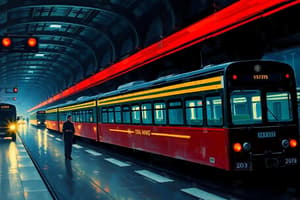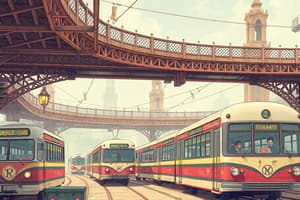Podcast
Questions and Answers
What is the main purpose of a transportation system?
What is the main purpose of a transportation system?
- To maintain environmental standards
- To design infrastructure for recreational purposes
- To facilitate the movement of people and goods (correct)
- To manage vehicle production
Which of the following is NOT considered an input in a transportation system?
Which of the following is NOT considered an input in a transportation system?
- Energy
- Infrastructure
- Environmental impacts (correct)
- Vehicles
What is one of the processes involved in the operation of a transportation system?
What is one of the processes involved in the operation of a transportation system?
- Cargo transportation
- Supply chain management
- Passenger usage
- Planning (correct)
How does a well-designed transportation system contribute to the quality of life in a region?
How does a well-designed transportation system contribute to the quality of life in a region?
What might be a social impact of a transportation system?
What might be a social impact of a transportation system?
What is one of the primary social functions of transportation systems?
What is one of the primary social functions of transportation systems?
How do transportation systems impact political functions?
How do transportation systems impact political functions?
Which of the following statements best describes the economic relationship with transportation systems?
Which of the following statements best describes the economic relationship with transportation systems?
What is a significant environmental effect associated with transportation systems?
What is a significant environmental effect associated with transportation systems?
What component is not considered part of the transportation system infrastructure?
What component is not considered part of the transportation system infrastructure?
Flashcards are hidden until you start studying
Study Notes
Definition of a Transportation System
- A transportation system comprises interconnected components including infrastructure, vehicles, and operations to facilitate movement.
- It encompasses multiple transportation modes: air, land, and water.
- Well-designed systems enhance city and regional operations, accessibility, economic activity, and quality of life.
Inputs, Outputs, and Processes
- Inputs include:
- People: Passengers utilizing the system.
- Goods: Cargo being transported.
- Vehicles: Transportation means like cars, buses, trains, and airplanes.
- Infrastructure: Roads, railways, airports, and related facilities.
- Energy: Fuel or electricity for vehicle operation.
- Processes involve:
- Planning: Developing transportation strategies and plans.
- Design: Engineering transportation infrastructures and vehicles.
- Construction: Building necessary facilities.
- Operation: Management and maintenance of systems.
- Maintenance: Upkeep and upgrades of infrastructure and vehicles.
- Outputs consist of:
- Mobility: Efficient movement of people and goods.
- Accessibility: Ease of reaching destinations.
- Economic benefits: Job creation, business growth, and increased trade.
- Environmental impacts: Air and noise pollution, land use changes.
- Social impacts: Alterations in community structure and quality of life.
Relationship to Other Systems
- Transportation is vital to the economy and influences spatial relationships among locations.
- It connects regions and economic activities while linking people globally.
- Social Impact: Enhances accessibility to healthcare and cultural activities and influences mobility and social relations.
- Political Role: Governments fund and regulate transportation, impacting national development and unity.
- Economic Impact: Transportation's evolution drives economic development; it connects industries and enhances timescales for economic activities.
- Environmental Effects: Significant concerns include public health, noise, air, and water quality, necessitating consideration of environmental costs.
- Energy Considerations: Transportation is energy-intensive, with trade-offs between speed and energy consumption influencing economic returns.
Components of a Transportation System
- Infrastructure: Comprises all fixed assets necessary for transportation, such as roads, railways, airports, ports, terminals, and maintenance facilities.
- Capital Goods: Infrastructure acts as essential capital goods that sustain societal operations but are not directly consumed.
- Environmental Aspects: Transport planning must also consider relevant environmental factors affecting operation.
Studying That Suits You
Use AI to generate personalized quizzes and flashcards to suit your learning preferences.




